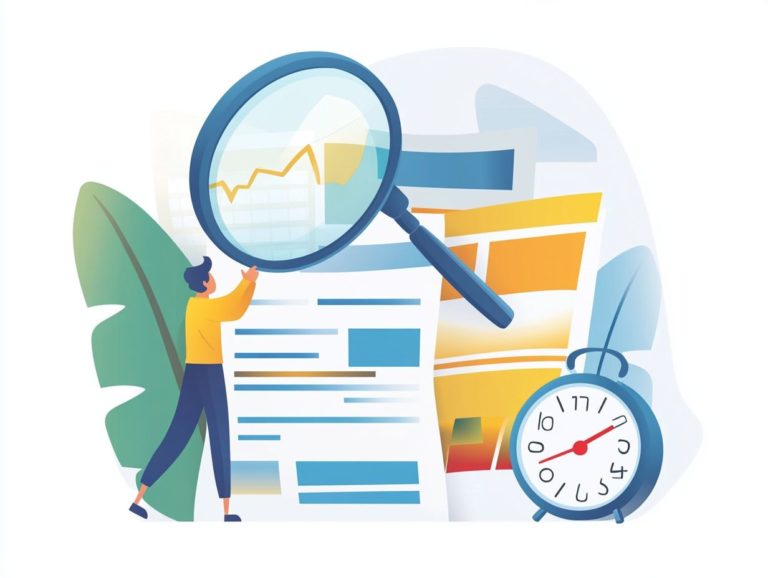The Role of Credit Counseling in Score Improvement
Understanding credit can feel daunting, particularly when you encounter challenges that threaten your financial well-being.
Credit counseling serves as a valuable lifeline, equipping you with the knowledge to understand your credit situation, pinpoint issues, and develop actionable plans for improvement.
This article explores the importance of credit counseling and how it can boost your credit score. Whether you’re grappling with debt or striving to enhance your financial literacy, the insights provided here can guide you toward a more promising credit future.
Contents
- Key Takeaways:
- Understanding Credit Counseling
- How Credit Counseling Can Help Improve Your Credit Score
- The Process of Credit Counseling
- Choosing a Credit Counseling Agency
- Frequently Asked Questions
- What is the role of credit counseling in score improvement?
- How does credit counseling help in improving credit scores?
- Is credit counseling a good option for improving credit scores?
- Can credit counseling lead to a decrease in credit scores?
- How long does it take to see an improvement in credit scores with credit counseling?
- Is credit counseling expensive?
Key Takeaways:

Credit counseling helps you understand and address credit issues. Its goal is to improve your credit score.
Through credit counseling, you can identify problem areas and create a personalized action plan to manage your debts and improve your credit score.
When choosing a credit counseling agency, it’s important to consider factors such as reputation and accreditation. Be wary of red flags like high fees and promises of a quick fix.
Understanding Credit Counseling
Don t wait! Understanding credit counseling can be your first step toward financial stability. It equips you with vital tools and resources to navigate your financial journey.
Nonprofit credit counseling services offer certified professionals who help you tackle debt problems, set achievable financial goals, and enhance your overall financial health.
These services typically include financial education seminars, personalized one-on-one counseling sessions, and customized budgeting plans tailored specifically to your situation. This comprehensive approach ultimately guides you toward a debt-free life.
With an array of resources at your disposal, it’s crucial to fully grasp the benefits of credit counseling and its potential impact on your financial future.
What is Credit Counseling?
Credit counseling is an invaluable service offered by nonprofit organizations designed to assist you in managing your debts and enhancing your overall financial health.
These organizations provide a range of services tailored to your unique financial situation, including budgeting assistance, debt management plans, and educational resources. Certified professionals conduct thorough assessments of your financial status and guide you toward sustainable solutions.
By seeking credit counseling, you’ll gain access to expert advice and support, significantly improving your understanding of personal finance and empowering you to make informed decisions. Ultimately, turning to nonprofit credit counselors can pave the way for lasting financial stability and peace of mind.
How Credit Counseling Can Help Improve Your Credit Score
Credit counseling serves as an invaluable resource for those seeking to elevate their credit score. It provides customized debt management strategies and actionable steps designed to enhance your financial well-being.
By collaborating with certified professionals, you can discover effective debt repayment strategies that significantly improve your credit utilization and overall credit history, ultimately leading to a more favorable credit score over time.
These counseling sessions emphasize the importance of cultivating sustainable financial habits and making informed decisions, thereby empowering you on your path to a brighter financial future.
Ready to take control of your finances? Reach out to a credit counselor today!
Identifying and Addressing Credit Issues

Identifying and addressing credit issues is an essential first step in your credit counseling journey. It allows you to grasp your financial obligations and enhance your overall financial behaviors.
Let s kick off by reviewing your credit report, which provides a detailed look at your financial history. By analyzing this report, you can uncover errors, late payments, and high debt-to-income ratios this ratio compares how much money you owe to how much you earn that might be dragging down your credit score. Recognizing these issues is crucial, as it not only clarifies your current financial standing but also empowers you to make informed decisions as you move forward.
Engaging with professional credit counselors provides valuable guidance in developing effective strategies to tackle these pitfalls. These experts often offer a personalized plan, assisting you in cultivating healthier financial habits that pave the way for long-term stability.
Creating an Action Plan
Creating an action plan is essential in credit counseling, helping you set clear financial goals while outlining the steps needed to achieve them.
An effective action plan includes several key elements that work together to pave the way for your financial stability. First, establishing specific financial goals is crucial; these objectives give you direction and motivation, making it easier for you to focus on what truly matters. Alongside this, developing a debt management plan can significantly alleviate financial stress by offering a structured approach to tackling your outstanding liabilities.
Don’t underestimate the power of budgeting; it s a vital tool for tracking your expenses. It ensures you live within your means and allows you to allocate funds towards both savings and debt repayment. By bringing all these components together, you create a robust financial strategy that enhances your chances of success.
The Process of Credit Counseling
The journey of credit counseling usually commences with an initial consultation and assessment. During this stage, certified professionals will meticulously evaluate your financial situation and provide customized advice designed to enhance your financial well-being.
Initial Consultation and Assessment
The initial consultation and assessment in credit counseling lay the groundwork for understanding your financial landscape and pinpointing the steps necessary for effective debt management.
During this first meeting, counselors gather essential information, including your income levels, outstanding debts, monthly expenses, and overall financial goals. This comprehensive assessment empowers the counselor to craft a personalized financial plan that takes every aspect of your situation into consideration.
By diving into your spending habits and prioritizing debts, this process not only sheds light on immediate concerns but also establishes a roadmap for your future financial stability. The insights gained during this initial consultation play a pivotal role in shaping subsequent counseling sessions, enabling tailored strategies that align perfectly with your unique needs and aspirations.
Developing a Budget and Debt Management Plan

Developing a budget and a debt management plan is an essential step in your credit counseling journey, enabling you to create manageable payments while effectively handling your financial obligations.
By outlining your income and expenses, you gain a clearer understanding of your financial landscape, which is crucial for making informed decisions. When you grasp concepts like interest rates, repayment strategies, and the importance of building emergency funds, you’re more likely to set realistic financial goals.
This informed approach not only helps to minimize stress but also reduces the chances of falling deeper into debt, ultimately guiding you toward a more secure financial future.
Ready to take control of your finances? Contact a credit counselor today!
Choosing a Credit Counseling Agency
Selecting the right credit counseling agency is crucial for anyone seeking nonprofit credit counseling. This choice guarantees access to certified professionals equipped to guide you effectively in reaching your financial goals while ensuring your consumer financial protection.
Factors to Consider
When selecting a credit counseling agency, consider several key factors to ensure you receive top-notch services from certified professionals and reputable nonprofit organizations.
Start by evaluating the agency’s certification, as this serves as a crucial indicator of their commitment to industry standards and ethical practices. Take the time to explore the range of services they offer, which may include:
- Debt management plans
- Financial education workshops
- Budgeting assistance
It’s essential to understand the agency’s approach to consumer financial protection. A trustworthy agency will prioritize transparency, offering clear information about fees and potential outcomes. This gives you the power to make well-informed decisions about your financial future.
Red Flags to Watch Out For
Identifying red flags when choosing a credit counseling agency is essential to steer clear of scams and ensure you receive sound financial advice and consumer protection.
Remain vigilant and recognize early warning signs that could indicate an agency lacks credibility. For instance, if you encounter high fees that seem excessive compared to the services offered, this should raise a significant red flag.
A lack of transparency regarding their methods and fees can create distrust, making it challenging for you to gauge the true value of their offerings.
Act fast! Watch out for pushy ads that pressure you into quick decisions; these often signal that the agency prioritizes profit over genuine assistance. By staying aware of these concerns, you can make more informed choices and protect your financial well-being.
Frequently Asked Questions

What is the role of credit counseling in score improvement?
Credit counseling plays a crucial role in helping individuals improve their credit scores by providing them with financial education and guidance on managing their credit effectively.
How does credit counseling help in improving credit scores?
Credit counselors work with individuals to create personalized debt management plans, negotiate with creditors for lower interest rates and payments, and provide tips on building a positive credit history.
Is credit counseling a good option for improving credit scores?
Yes, credit counseling is an excellent option for those struggling to manage their credit. It can provide valuable advice, resources, and support to help individuals improve their credit scores.
Can credit counseling lead to a decrease in credit scores?
No, credit counseling itself does not have a direct impact on credit scores. However, working with a credit counselor to create a debt management plan may temporarily lower the individual’s score due to closing accounts and changing payment terms.
How long does it take to see an improvement in credit scores with credit counseling?
The time it takes to see an improvement in credit scores with credit counseling can vary depending on the individual’s specific credit situation. However, on average, individuals can see improvements within six to twelve months of enrolling in a credit counseling program.
Is credit counseling expensive?
Most credit counseling agencies offer their services at little to no cost. They are typically funded by donations, grants, and fees paid by creditors. However, some agencies may charge a small fee for their services, which should be disclosed upfront.






